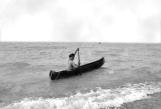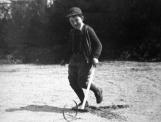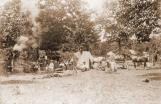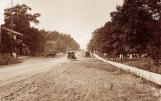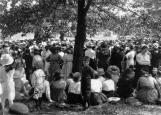14
Swimming and sunbathing1925
Grand Bend, Ontario
Swimming and sunbathing were ideal at Grand Bend with its long expanse of pure white sandy beach. We used to make huge rafts of logs thrown up by storms and at the end of our swim pull them well up on the beach. A sand bar a hundred feet or so from the shore helped to moderate the temperature of the water and made swimming relatively safe. In storms the breakers came in long combers which would carry us from the sand bar to the shore, but we had to beware the undertow which was very strong. I well remember the shock of seeing a victim of the undertow dragged ashore by friends and the vain attempts made to revive him by artificial respiration. When a doctor arrived he pronounced him dead.
In a heavy gale it was almost impossible to stay on the beach as the wind whipped up the sand with a stinging force. We used to go down to the pier by the river, however, and watch the breakers dash against it with incredible force. Sometimes a good deal of damage was done, but it was immediately repaired when the storm was over.
Credits:H. Pearson Gundy
16
Boating on the river and lakeGrand Bend, Ontario
Except for the driest summers, it was possible to canoe for long stretches of the old Ausable River bed but as we did not own a canoe this was a delight we had to forego. Boating on Lake Huron was treacherous, as sudden squalls could send huge breakers crashing against the shore. But when we were old enough to be cautious and had become strong swimmers, father got us a fine cedar rowboat which gave us a great deal of pleasure. We would row close to shore several miles up the lake, put in at a favourite cove, go swimming in the nude (what bliss not to have a wet, clinging bathing suit next one's skin!) then build a camp fire, eat our beans and bacon, bread and jam, and row back to the beach in front of our tent on the bluff.
Credits:H. Pearson Gundy
18
Rainy days and lazy days1925
Grand Bend, Ontario
On rainy days we used to play house on the front verandah by draping patchwork quilts over chairs placed on their sides to form rooms with connecting tunnels, a game we never tired of, for as we got older and graduated from this form of amusement we helped to set up the patchwork play-houses for the younger members of the family.
As small boys we went barefoot all summer (except at church services) and our feet became so toughened and calloused we could run with ease over gravel roads or blistering hot sand. We had fun driving hoops large iron hoops they were which came from old carriage wheels, and these we propelled or guided with a short stick. Between our cottage and the village proper there was a winding gravel road over two or three small hills ideal for "hooping". With a hoop humming along beside one, it was no chore at all to go for the mail or take a grocery order to the general store.
Credits:H.Pearson Gundy
20
Great storms and brilliant sunsets1925
Grand Bend, Ontario
Once when Brad was with us we had a bad fright. It had been hot and sultry all day with big thunderheads building up in the northwest. By early evening the sky was completely overcast with black menacing clouds; there was that eerie calm before the storm and then, with a sudden gale-force wind and driving rain, the storm was upon us. Forked lightning flashed in brilliant arcs almost simultaneously with thunder, like the clap of doom, which shook the cottage and made our teeth rattle as we huddled together. A blinding flash seemed to pass directly over us as it struck a tall pine not far from the cottage and a few seconds later we heard other trees come crashing down. If one hit the cottage we wore done for, but there was no place we could go to be safer. Then suddenly it was all over; the sky cleared and there was a brilliant sunset. We ventured forth, still rather shaken, to see the damage. Seven tall pines had been struck within a few hundred yards of the cottage. We were on the "Exeter Side" of the park; across the main road on the "Parkhill Side" there had been no damage at all. [Generally people from Exeter had cottages together on one side of town; Parkhill had another part and London residents had cottages in their own part of town.]
Credits:H Pearson Gundy
23
Tentingc. 1925
Grand Bend, Ontario
As the family outgrew the original three bedrooms, additional sleeping quarters were provided by two large canvas tents, one right beside the cottage for the small fry, the other on a lakefront bluff about a quarter of a mile away, where my brother Ed and I camped, usually with one or two friends. To us, this place was a haven of delight. Cedars and pines grew on the bluff affording some protection from the winds. The tent was well tethered to a large wooden platform base which extended about four feet in front, forming a verandah which, like the tent, was covered by a canvas fly. On the lakeside the bluff sloped down steeply to the white sandy beach. At the base of the bluff on the landside was a clump of trees overgrown with climbing ivy vines. When we had cleaned out the underbrush and trimmed the lower branches of the trees we had a natural arbour which served as our kitchen and dining room. Between the centre trees we nailed planks to form a table with benches on either side; empty orange crates nailed together formed a convenient cupboard. Our camp stove had a tall stove-pipe which projected well above the arbour.
Credits:H. Pearson Gundy
25
Village Charactersc. 1915
Grand Bend, Ontario
There were other characters in the village who remain vividly in my mind after half a century. One was old Mr. Brenner, enormously fat, who sat on the verandah of his hotel from morning to night, chewing tobacco and talking to his cronies, stirring from his out-size chair only to consume his meals. Then there was Cy Green, tough and salty fisherman, who fathered 18 or 20 children and was surrounded by innumerable grandchildren. If you met one of the young Greens pushing a baby carriage and asked if this was a new brother, he was quite likely to reply; "Nope, that's my uncle!"
And there was old Gus, a derelict Popeye, whose job it was to rent row-boats on the lakefront. He had a fund of stories about his early days on the Great Lakes, about storms and wrecks and drownings. At noon he would pull from his tattered coat pocket a large piece of cheese and a couple of Spanish onions which he would bite into as if they were apples, to our unfailing astonishment.
Credits:H. Pearson Gundy
27
Sunday Service in the fresh airc. 1925
Grand Bend, Ontario
Sunday church service for the cottagers at Grand Bend was held in the open. There was a covered stand for the preacher and organist at the foot of a curving hill which formed a natural amphitheatre. There were a few benches but most of the congregation brought their own rugs and sat on the ground. Old Mr. Huston, tall, lean, bald, with a white goatee led the singing, his steel-rimmed spectacles perched on the end of his nose. What he lacked in musicianship he made up in fervour. Gospel Songsheets were used, which included also a few hymns common to all denominations.
Credits:H. Pearson Gundy

